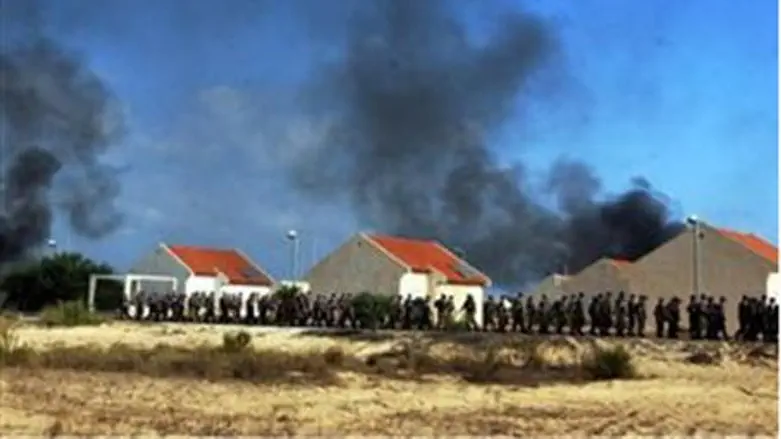
Prime Minister Binyamin Netanyahu is well aware of the dangers of a second “Disengagement,” says Minister of Diaspora Affairs Yuli-Yoel Edelstein in an interview with Arutz Sheva's Hebrew-language news service. His comments were made on the fifth anniversary of the Disengagement from Gaza and northern Samaria, called the Expulsion by many Israelis.
Most of the Israeli public opposes unilateral withdrawal, Edelstein said. Many opposed the idea of unilateral withdrawal before the Disengagement, and many others became convinced of the dangers of unilateral withdrawal in the years that followed, when Hamas rose to power in Gaza and residents of southern Israel came under daily rocket attack.
Those who continue to believe in the power of unilaterally uprooting Jewish towns and giving the land on which they were built to the Palestinian Authority are a small minority, Edelstein said.
He rejected rumors that Israel has agreed to make territorial concessions in order to bring the PA to the negotiating table. “Israel has not committed to destroy Jewish towns or to carry out territorial withdrawals,” he said.
Netanyahu is under “tremendous pressure” to make concessions to the PA, Edelstein said. However, he added, Likud members do not plan to counter that pressure by presenting the Prime Minister with a list of “red lines” that must not be crossed in negotiations.
“It's very important that we not tie the Prime Minister's hands,” he claimed. “In this case it might be in our favor, but some other time it won't be.”
When asked about Likud Minister Dan Meridor's recent suggestion that the Judea and Samaria construction freeze be extended, Edelstein replied that Meridor's opinion is not shared by his fellow Likud members. “Minister Meridor is a distinguished and experienced minister, but it would be exaggerating to think that he's the one influencing the Prime Minister's decisions. He does his work well, but his stance regarding withdrawals is fairly unusual in the Likud,” he said.
Edelstein also discussed President Peres, who has offered suggestions of his own as to what Israel should concede to the PA, including a plan to hand over Jewish communities in Judea and Samaria by stages during negotiations, leaving a handful of “blocs” in the region in which Jews would be allowed to live.
"From his first day as President, Peres made it clear that he would not be content with shaking hands, and would strive to be active in the political process," Edelstein recalled. “Sometimes he makes things easier for us, for instance when he explains Israel's views to the world, and sometimes he backs positions that we like less,” he stated. Israeli presidents are expected to avoid personal or patisan political stands.
Also on the anniversary, a large group of rabbis met at the Katif Bloc museum in Jerusalem to memorialize the torching and wantondestruction of the synagogues in the Katif Bloc by the Gazans who took over on the day of the Disengagement